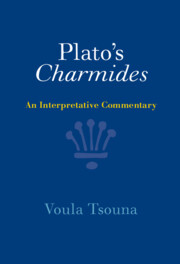Contents
3Charmides’ First Definition of Sôphrosynê: Temperance Is a Kind of Quietness (159b1–160d4)
4Charmides’ Second Definition: Temperance Is a Sense of Shame (160d5–161b4)
5Charmides Abandons the ‘Best Method’: The Third Definition – Temperance Is ‘Doing One’s Own’ (161b4–162b11)
6Enter Critias: The Third Definition Revisited – Temperance Is the Doing or Making of Good Things (162c1–164d3)
7Critias’ Speech: Temperance Is Knowing Oneself (164d4–165c4)
8Socrates and Critias Debate the Technê Analogy: From ‘Knowing Oneself’ to ‘the Knowledge of Itself’ (165c4–166e3)
9Critias’ Final Definition: ‘Temperance Is the Science of Itself and the Other Sciences’ or ‘the Science of Science’ (166e4–167a8) – the Third Offering to Zeus (167a9–c8)
10Can There Be an Epistêmê of Itself?: The Argument from Relatives (167c8–169c2)

